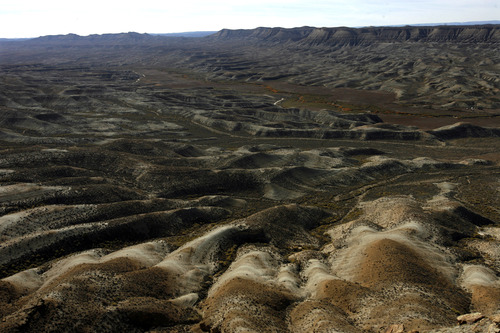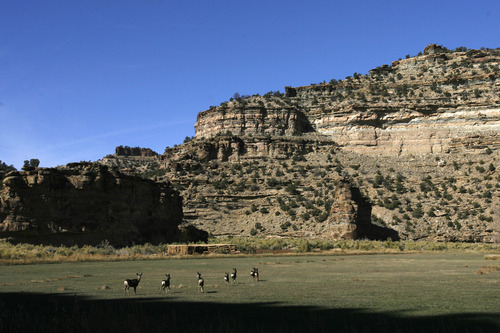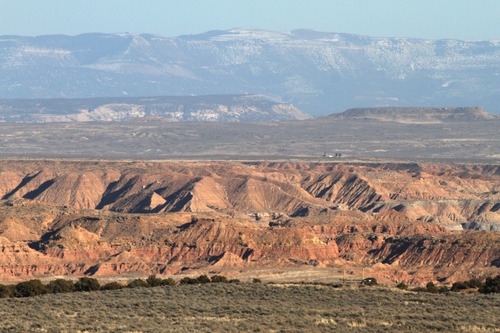This is an archived article that was published on sltrib.com in 2013, and information in the article may be outdated. It is provided only for personal research purposes and may not be reprinted.
A recent decision to lease nearly 100,000 acres of Utah's Book Cliffs for oil and gas exploration has shocked sportsmen's groups, whose leaders contend the unroaded portions of these state lands are more valued as wildlife habitat than for its energy potential.
Several groups have been aggressively lobbying to protect these state lands when they learned last week that the Utah School and Institutional Trust Lands Administration (SITLA) board agreed on Aug. 20 to lease the land in Grand County to Anadarko Petroleum Corp., a global player in energy production.
"We came to the table hat in hand wanting to work together," said Byron Bateman, president of Sportsmen for Fish and Wildlife. "Sportsmen have always been fair dealers in this realm. We recognize the need for energy and we understand that these needs should be balanced with the needs of fish, wildlife, conservation and other uses in the state of Utah. Backroom deals done in secret, particularly while all of us are trying to work through an open process negates the work of our elected officials as well as undercuts funding for our children."
SITLA officials say they are required to manage the state's 3 million acres of trust lands "like a business" that maximizes revenues for schools and other designated beneficiaries, and that often requires arranging deals in confidence. The Anadarko deal, which has yet to be finalized, will be the largest oil and gas lease SITLA has ever negotiated, worth potentially hundreds of millions of dollars, according to deputy director Kim Christy.
He could not divulge the financial arrangements for the lease, but SITLA would take a 17 percent royalty on all minerals produced.
"We would rather be celebrating this deal instead of throwing rocks at it," Christy said. He noted that SITLA's Book Cliffs Block is the agency's largest contiguous holding, amassed over several decades with an eye toward mineral development. The southern half, hugging a part of the Uintah and Ouray Indian Reservation the Utes protect as sacred hunting grounds, has long been viewed as a place to be managed for its wildlife and roadless attributes, perhaps creating an expectation that it could be shielded.
The fact is these lands were never a candidate for an exchange that would have put them off limits to development, Christy said. Still, the agency intends to work with state wildlife officials, as it has in the past, and the energy company to minimize habitat damage.
"We will preserve to the extent possible the integrity of this roadless area," Christy said.
Anadarko approached SITLA with its interest in hunting for oil under the scenic cliffs that tumble from the Tavaputs Plateau into the valley drained by the Colorado River near the Colorado state line. The southern half of the 100,000-acre lease area is unroaded, while the northern half, known as Three Pines, has been explored in the past and contains federal inholdings already leased for oil and gas development. Anadarko would access much of the unroaded terrain by helicopter to perform seismic testing, Christy said.
A consortium of sportsmen's groups that included SFW, Trout Unlimited, the Rocky Mountain Elk Foundation and Backcountry Hunters and Anglers released a joint statement Monday condemning the lease decision's lack of transparency and potential impact on rugged lands that harbor world-class elk and other charismatic wildlife species.
"We find it insulting. [SITLA] basically stabbed us in the back," said Casey Snider, Utah coordinator for Trout Unlimited. "[SITLA] didn't give us any indication this was cooking and we only find out after a decision is made."
Just a few weeks ago, Snider helped organize a pack trip through the Book Cliffs with SITLA board member Jim Lekas, congressional staffers and one of Gov. Gary Herbert's advisers to build a case for protecting this area's wildlife.
Regarding the lack of transparency leading up to its board's decision last week, SITLA said it honored Anadarko's request for confidentiality in the formative stages of the deal.
The SITLA block is striped with former ranchlands private foundations acquired and donated to the state to be managed for wildlife. State wildlife officials agree the Book Cliffs are critical habitat for big game, including black bears, and hope protections can be designed into whatever drilling projects arise from the lease.
"We live in a landscape of many uses. Our attitude and approach is to speak about wildlife and fish values before leases are issued.
Once a mineral right or a lease is in place it has a lot of superior position in regard to the law," said Bill James, the Division of Wildlife Resources' program manager focused on energy development.
Anadarko, which may begin exploration as early as fall, pledged to engage sportsmen and other stakeholders to ensure all development is conducted responsibly.
"Though it is still very early in what we expect to be a multi-year evaluation process, our initial activity will occur in areas where there is already existing oil and natural gas wells and infrastructure," the company's Denver-based spokeswoman Robin Olsen said.







